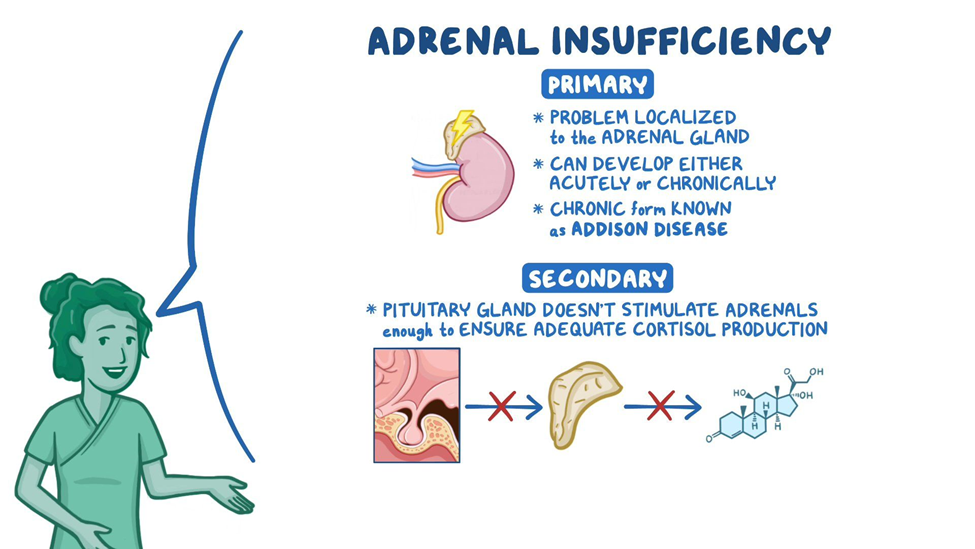The nurse is caring for a patient with Addison's disease who is scheduled for discharge. When teaching the patient about hormone replacement therapy, the nurse should address what topic?
The need to match the daily steroid dose to immediate symptoms
The importance of monitoring liver function
The need for life-long steroid replacement
The possibility of extreme weight loss from use of corticosteroids
The Correct Answer is C
A. The need to match the daily steroid dose to immediate symptoms:
Explanation: Adjusting the steroid dose based on immediate symptoms is not a recommended approach. Patients should follow the prescribed regimen provided by their healthcare provider.
B. The importance of monitoring liver function:
Explanation: While monitoring liver function is important for some medications, it is not the primary focus when teaching about hormone replacement therapy in Addison's disease. The emphasis is on the need for life-long steroid replacement.
C. The need for life-long steroid replacement:
Explanation: Patients with Addison's disease require life-long steroid replacement therapy to compensate for the deficiency in adrenal hormones. It's important for the patient to understand that adherence to the prescribed steroid regimen is essential for maintaining health and preventing adrenal crisis.
D. The possibility extreme weight loss from the use of corticosteroids:
Explanation: While corticosteroids can have various side effects, extreme weight loss is not a typical or desired outcome of steroid therapy for Addison's disease. Weight changes and potential side effects should be discussed, but the emphasis should be on the importance of long-term steroid replacement.

Nursing Test Bank
Naxlex Comprehensive Predictor Exams
Related Questions
Correct Answer is B
Explanation
A.Regular insulin typically begins to take effect 30 minutes after administration. Administering insulin at the time of the meal (1645) would not allow enough time for the insulin to reach its onset of action, potentially resulting in the blood glucose level being high during the meal.
B.Regular insulin has an onset of action of 30 minutes. By administering the insulin at 1615, it will start to take effect by 1645, when the meal arrives, and help ensure the insulin action aligns with the meal, preventing postprandial hyperglycemia.
C.Administering insulin at 1545 would be too early and could lead to the insulin peaking before the meal, which could result in hypoglycemia if the insulin peak occurs before the patient has food to absorb the glucose.
D.Administering insulin at 1600 would result in the insulin starting to work too soon, with the onset happening before the meal and possibly leading to hypoglycemia if the insulin peaks before the meal is consumed.
Correct Answer is A
Explanation
A. "If a vial of insulin will be used up within 21 days, it may be kept at room temperature."
This statement suggests a duration of up to 21 days for room temperature storage after the vial is in use. However, most insulins can typically be stored at room temperature for up to 28 days after initial use. This recommendation might be more conservative than necessary for many types of insulin.
B. "If a vial of insulin will be used up within 2 weeks, it may be kept at room temperature."
This choice suggests a timeframe of 14 days for room temperature storage after opening the vial. However, for many insulins, the recommended duration for room temperature storage after opening is up to 28 days.
C. "If you are going to use up the vial within 1 month, it can be kept at room temperature."
This option extends the timeframe to 1 month for room temperature storage after the vial is in use. However, the generally recommended duration for many insulins is up to 28 days after opening.
D. "If a vial of insulin will be used up within 1 week, it may be kept at room temperature."
This choice suggests a very short duration of 7 days for room temperature storage after opening the vial. Most insulins can typically be stored at room temperature for a longer duration after initial use.
Whether you are a student looking to ace your exams or a practicing nurse seeking to enhance your expertise , our nursing education contents will empower you with the confidence and competence to make a difference in the lives of patients and become a respected leader in the healthcare field.
Visit Naxlex, invest in your future and unlock endless possibilities with our unparalleled nursing education contents today
Report Wrong Answer on the Current Question
Do you disagree with the answer? If yes, what is your expected answer? Explain.
Kindly be descriptive with the issue you are facing.
